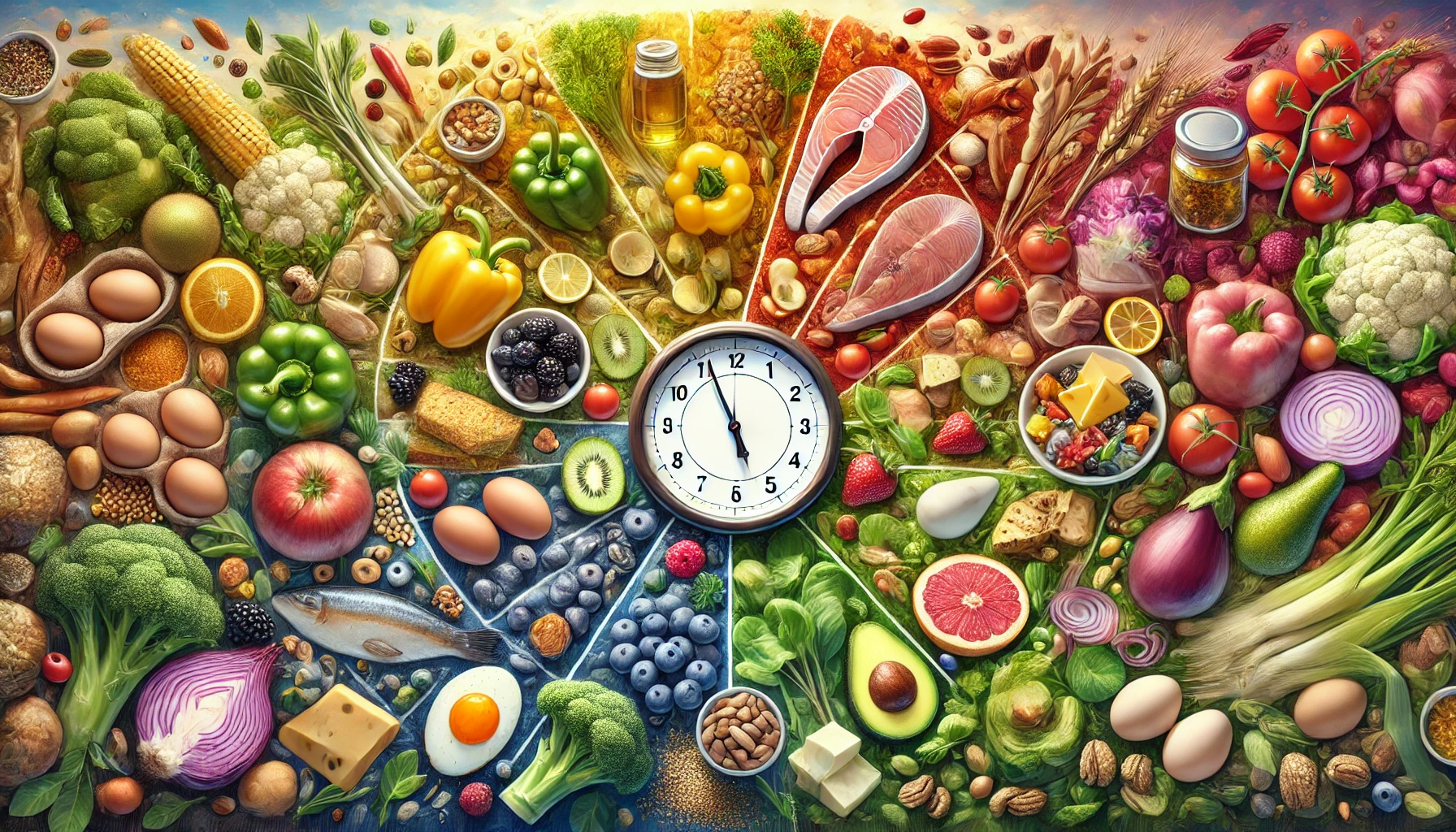The Secrets of the Mediterranean Diet: A Guide to Weight Loss and Health
The Mediterranean Diet has long been praised for its numerous health benefits, from weight loss to heart health, and it’s no wonder why it’s often considered one of the healthiest diets in the world. Inspired by the eating habits of people living in the Mediterranean region, this diet focuses on fresh, wholesome foods, plenty of healthy fats, and an abundance of plant-based ingredients. It’s a lifestyle change rather than a temporary fix, one that promotes long-term wellness, happiness, and vitality.
This ultimate guide to the Mediterranean Diet will take you through its core principles, provide practical tips on how to incorporate it into your daily routine, and explain how it supports weight loss, boosts energy, and improves overall health. Whether you’re looking to shed some pounds, reduce the risk of chronic diseases, or simply adopt a more balanced, nutrient-rich way of eating, the Mediterranean Diet offers an approach that can fit seamlessly into your lifestyle.
The Mediterranean Diet: A Time-Tested Approach to Healthy Eating
The Mediterranean Diet isn’t a new concept. It’s a traditional way of eating that has been passed down for generations in countries bordering the Mediterranean Sea, including Greece, Italy, Spain, and southern France. The diet is centered around foods that are fresh, seasonal, and locally sourced, with a focus on healthy fats, whole grains, vegetables, fruits, and lean proteins.
At its core, the Mediterranean Diet emphasizes whole, unprocessed foods that nourish the body. It’s not about restrictive calorie counting or eliminating entire food groups; it’s about choosing nutrient-dense foods that fuel your body while also bringing joy and satisfaction to your meals. A hallmark of the Mediterranean Diet is its balance: healthy fats, fiber, lean proteins, and a variety of plant-based foods all come together to promote overall health and well-being.
Key Components of the Mediterranean Diet
The Mediterranean Diet is structured around a few key components that promote health, weight loss, and longevity. These foods aren’t just nutritious; they also help your body function optimally, support fat-burning, and provide energy. Let’s take a closer look at the main food groups that make up this diet.
Fruits and Vegetables: The Heart of the Mediterranean Diet
Fruits and vegetables are the foundation of the Mediterranean Diet. Packed with fiber, vitamins, minerals, and antioxidants, these plant-based foods help support healthy digestion, reduce inflammation, and protect against chronic diseases. The diet encourages the consumption of a variety of fruits and vegetables, with an emphasis on seasonal, local produce. Leafy greens like spinach, kale, and arugula are staples, while tomatoes, cucumbers, peppers, and eggplant are also frequently used.
Not only do these foods provide essential nutrients, but they are also low in calories, making them ideal for weight loss. They help you feel full and satisfied without adding excess calories, making it easier to maintain a healthy weight while nourishing your body.
Healthy Fats: The Power of Olive Oil
When it comes to fats, the Mediterranean Diet prioritizes healthy fats, particularly extra virgin olive oil. Olive oil is rich in monounsaturated fats, which are known for their heart-healthy benefits. It helps reduce bad cholesterol levels, lowers the risk of heart disease, and promotes healthy blood sugar levels.
Olive oil is used liberally in the Mediterranean Diet, whether it’s drizzled over salads, used for cooking, or as a dip for whole-grain bread. In addition to olive oil, other healthy fat sources include nuts, seeds, and avocados. These fats are not only beneficial for heart health but also help improve satiety, meaning you’ll feel fuller longer after meals.
Whole Grains: A Foundation for Energy
Whole grains are another key component of the Mediterranean Diet. Unlike refined grains, which are stripped of nutrients, whole grains like quinoa, barley, farro, and brown rice are packed with fiber, B vitamins, and essential minerals. These grains help stabilize blood sugar levels, provide long-lasting energy, and improve digestive health.
Whole grains are incorporated into a variety of Mediterranean dishes, from grain salads to soups, and can be paired with vegetables, beans, or lean proteins for a balanced meal. They provide the necessary carbohydrates to fuel the body, especially for those who are active and looking to maintain healthy energy levels throughout the day.
Lean Proteins: Fish, Poultry, and Legumes
While the Mediterranean Diet does include animal products, the focus is primarily on lean protein sources. Fish and seafood are central to the diet, particularly fatty fish like salmon, sardines, and mackerel, which are rich in omega-3 fatty acids. These healthy fats are known for their anti-inflammatory properties and have been linked to a reduced risk of heart disease and other chronic conditions.
Poultry, such as chicken and turkey, is also a common protein source, as are plant-based options like beans, lentils, and chickpeas. These plant-based proteins are high in fiber and offer a wide range of nutrients, making them an essential part of the Mediterranean Diet. By including a variety of protein sources, the Mediterranean Diet supports muscle health, promotes satiety, and helps maintain a healthy metabolism.
Herbs and Spices: Flavor Without the Calories
Rather than relying on salt to flavor meals, the Mediterranean Diet uses a variety of herbs and spices to enhance the natural flavors of food. Fresh herbs like basil, parsley, rosemary, thyme, and oregano are frequently used, along with spices like turmeric, cinnamon, and cumin. These herbs and spices not only add bold flavors but also offer a variety of health benefits, such as anti-inflammatory and antioxidant properties.
By using herbs and spices, the Mediterranean Diet encourages flavorful meals without the need for excess sodium or unhealthy additives. This not only makes the diet more enjoyable but also promotes better health by reducing the risk of hypertension and other health concerns linked to excessive salt intake.
Benefits of the Mediterranean Diet for Weight Loss
One of the most compelling reasons people choose the Mediterranean Diet is its ability to support healthy, sustainable weight loss. Unlike fad diets that promise rapid results with extreme calorie restriction, the Mediterranean Diet encourages gradual weight loss by focusing on nutrient-dense, whole foods that keep you full and satisfied.
The Mediterranean Diet is rich in fiber from fruits, vegetables, legumes, and whole grains, which help promote feelings of fullness and prevent overeating. Additionally, the healthy fats from olive oil, nuts, and seeds help to regulate hunger hormones, reducing cravings and making it easier to control your appetite.
Because the Mediterranean Diet is not overly restrictive, it’s easier to maintain over time. Unlike many diets that are difficult to stick to, the Mediterranean Diet allows for a wide variety of foods, making it enjoyable and sustainable. You won’t feel deprived, and you can still indulge in foods you love, making it a realistic long-term weight loss strategy.
How to Incorporate the Mediterranean Diet into Your Life
Adopting the Mediterranean Diet is simpler than you might think. It’s not about following a set meal plan but rather making small, gradual changes to your eating habits. Here’s how you can start incorporating the Mediterranean Diet into your life:
Start by adding more plant-based foods to your meals. Focus on increasing your intake of fruits, vegetables, and legumes. Aim to fill half your plate with these nutrient-rich foods at every meal.
Replace unhealthy fats with olive oil. Use extra virgin olive oil in your cooking, salads, and as a dip for bread. It’s a great source of healthy fat and adds flavor to dishes.
Incorporate more fish into your diet. Aim to eat fish at least twice a week, focusing on fatty fish like salmon, sardines, and mackerel.
Eat more whole grains. Switch out refined grains for whole grains like quinoa, barley, and brown rice. They’ll provide you with steady energy and help keep you feeling full longer.
Use herbs and spices liberally. Experiment with fresh herbs and spices to enhance the flavor of your meals without adding extra calories or salt.
The Mediterranean Diet: A Lifestyle for Long-Term Health
The Mediterranean Diet isn’t just about weight loss; it’s about embracing a healthier, more balanced lifestyle. The diet promotes overall well-being by reducing the risk of heart disease, improving brain function, and supporting a healthy digestive system. It’s a way of eating that nourishes both the body and the soul, bringing joy and satisfaction to your meals while helping you maintain a healthy weight.
By adopting the Mediterranean Diet, you’re not just making changes for today—you’re investing in your long-term health and happiness. It’s a lifestyle that can be enjoyed for years to come, providing you with the tools you need to live a vibrant, energetic life.
The Mediterranean Diet: Your Path to Wellness and Vitality
The Mediterranean Diet offers a sustainable, enjoyable way to lose weight, improve your health, and boost your energy. By focusing on fresh, whole foods, healthy fats, lean proteins, and plenty of fruits and vegetables, this diet supports your overall well-being and promotes a long, healthy life. With its emphasis on balance, moderation, and flavor, the Mediterranean Diet is a way of eating that you can embrace for life.
Let the Mediterranean Diet be your guide to a healthier, happier you. Take the first step today and enjoy the benefits of a diet that nourishes both your body and your soul.




